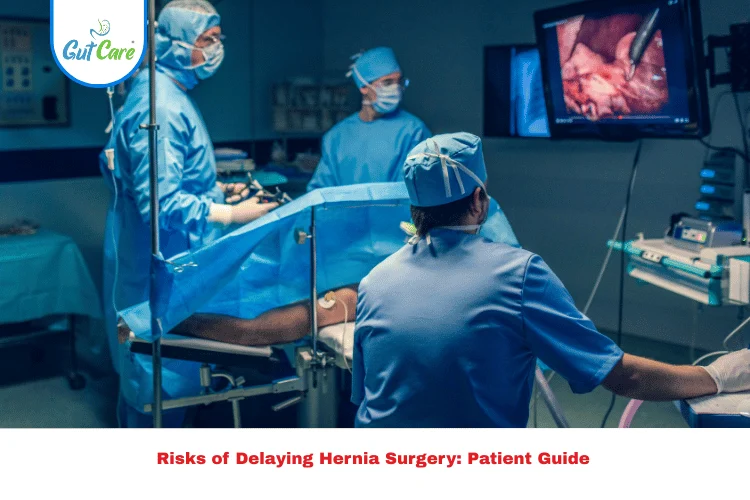Hernias can affect both men and women, but the presentation and causes often differ based on anatomy and lifestyle factors. Understanding the Types of Hernias in Women is essential for early detection, timely treatment, and long-term well-being.
At Gutcare Clinics in Bangalore, Dr. Yuvrajsingh Gehlot, an experienced colorectal surgeon, provides specialized care for women experiencing hernia-related concerns. This guide explains the Types of Hernias in Women, common symptoms, causes, and effective treatment options available today.
Understanding Hernia in Women
A hernia occurs when an internal organ or tissue pushes through a weak spot in the surrounding muscle or connective tissue. In women, hernias are often linked to abdominal wall weakness, pregnancy, chronic coughing, or heavy lifting. Recognizing the Types of Hernias in Women helps identify which kind may be affecting your health and when to seek professional care.
Types of Hernias in Women: Common Causes and symptoms
Learn about the different types of hernias in women, their common causes, symptoms, and effective care options for better recovery.
1. Inguinal Hernia
This is one of the most common hernias in females, occurring when part of the intestine or abdominal tissue protrudes through the lower abdominal wall near the groin.
Causes: Weak muscles, obesity, chronic coughing, or repetitive strain.
Symptoms: A visible bulge in the groin, discomfort when bending, and mild pain during activity.
Women may not notice an inguinal hernia immediately because it can remain hidden or small in size at first.
2. Femoral Hernia
A femoral hernia is more common in women than men, particularly in those who have had multiple pregnancies. It occurs just below the groin, where the femoral artery passes.
Causes: Pressure on the abdomen during pregnancy or chronic constipation.
Symptoms: A small lump near the thigh or groin, pain during movement, and discomfort when standing.
Femoral hernias require medical evaluation because they can sometimes lead to complications if left untreated.
3. Umbilical Hernia
An umbilical hernia occurs around the belly button when tissue pushes through a weak spot near the navel.
Common in: Women who have had multiple pregnancies or experience rapid weight changes.
Symptoms: Swelling or bulging near the belly button, mild tenderness, and discomfort during strain.
Treatment: In mild cases, this hernia may heal on its own, but persistent cases require medical attention from a colorectal surgeon like Dr. Yuvrajsingh Gehlot.
4. Incisional Hernia
An incisional hernia develops at the site of a previous abdominal surgery where the tissue hasn’t fully healed.
Causes: Surgical wounds, infection, or strain after surgery.
Symptoms: A bulge along a surgical scar, pain during activity, and weakness at the incision site.
At Gutcare Clinics, patients receive advanced surgical repair and post-operative guidance to prevent recurrence.
5. Hiatal Hernia
A hiatal hernia occurs when part of the stomach moves upward through the diaphragm into the chest cavity.
Causes: Obesity, persistent coughing, or strain from lifting.
Symptoms: Chest discomfort, difficulty swallowing, heartburn, and acid reflux.
Though this type doesn’t form a visible bulge, it can cause digestive distress and requires evaluation.
6. Obturator Hernia
This rare form of hernia affects women more frequently, especially those who are older or have experienced significant weight loss.
Symptoms: Pelvic pain, nausea, or difficulty walking.
Because it develops deep within the pelvic area, it may not be visible but can cause significant discomfort.
There are various types of hernias in women, including inguinal, femoral, umbilical, and incisional,hiatal ,obturator hernias. Each type develops differently and requires proper diagnosis and treatment.
Common Hernia Causes in Females
The Causes of Hernia in Males and Females can differ, but women are particularly prone due to:
- Multiple pregnancies
- Chronic coughing or constipation
- Heavy lifting or physical strain
- Age-related muscle weakening
- Previous abdominal surgeries
- Obesity or sudden weight changes
Maintaining good posture, a balanced diet, and regular exercise can help reduce the risk of developing hernias naturally.
Recognizing Hernia Signs
Identifying early hernia signs helps ensure faster recovery. Key warning signs include:
- Bulging or swelling in the abdomen or groin area
- Discomfort when lifting or coughing
- Pressure or dragging sensation in the lower abdomen
- Digestive discomfort or acid reflux (in hiatal hernias)
- Visible lump that increases with strain
Diagnosis and Treatment
At Gutcare Clinics, Bangalore, advanced diagnostic tools such as ultrasound or CT scans are used to confirm the type and extent of a hernia.
Treatment Options Include:
- Lifestyle modification: Weight management, avoiding strain, and strengthening core muscles.
- Non-surgical care: For small, symptom-free hernias, watchful waiting with lifestyle adjustments may be recommended.
- Surgical repair: For larger or painful hernias, minimally invasive laparoscopic surgery ensures quick recovery and minimal discomfort.
Dr. Gehlot and his team design personalized treatment plans based on each patient’s health condition and the classification of hernia identified.
Prevention Tips: How to Avoid Hernias Naturally
- Maintain a healthy body weight
- Eat fiber-rich foods to prevent constipation
- Avoid lifting heavy objects improperly
- Exercise regularly to strengthen abdominal muscles
- Stop smoking to reduce coughing-related pressure
- Seek timely medical advice for persistent discomfort
When to See a Specialist
If you notice a persistent lump, discomfort, or pain in your abdomen or groin, don’t ignore it. Hernias may worsen if left untreated. Consulting an experienced colorectal surgeon like Dr. Yuvrajsingh Gehlot at Gutcare Clinics, Bangalore, ensures accurate diagnosis and advanced care. Early intervention promotes quicker recovery and prevents complications.
Conclusion
Understanding the Types of Hernias in Women is crucial for early detection, safe treatment, and better health outcomes. Whether caused by physical strain, surgery, or lifestyle habits, hernias can be effectively managed with professional guidance. At Gutcare Clinics, women receive compassionate, personalized, and modern care focused on lasting relief and long-term wellness.
FAQs
1. What are the most common Types of Hernias in Women?
The most common types include inguinal, femoral, umbilical, and incisional hernias, each with distinct causes and symptoms.
2. What causes hernias in females?
Hernia causes in females include pregnancy, obesity, chronic coughing, constipation, and prior abdominal surgery.
3. Can women prevent hernias naturally?
Yes. Maintaining a balanced diet, exercising regularly, avoiding strain, and managing body weight can reduce the risk of hernias naturally.
4. How is a hernia treated at Gutcare Clinics?
At Gutcare Clinics, Dr. Yuvrajsingh Gehlot uses advanced diagnostic tools and minimally invasive surgical methods for effective hernia treatment.
5. When should a woman see a doctor for a hernia?
If there is a visible bulge, persistent pain, or digestive discomfort, immediate medical evaluation is recommended for proper hernia care.




